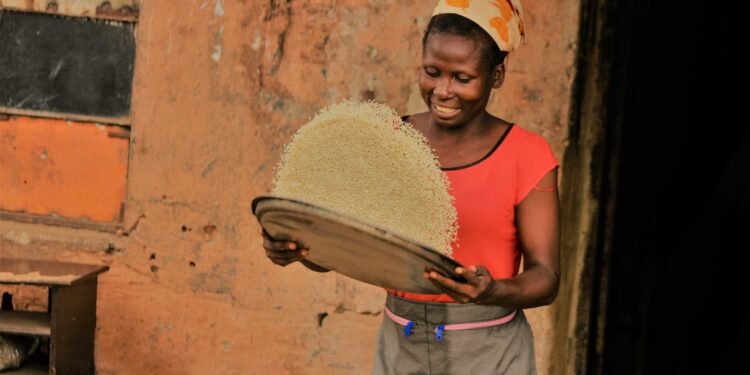Nigeria is the largest importer of rice in Africa and the fifth largest in the world behind China, India, and Iraq. As per statistics from Statista, in 2022, Nigeria imported 2.1 million metric tonnes of rice.
One would think that we major in importing just food and other agricultural produce but statistics from other commodities show just how import-reliant we are.
Nigeria is also the top importer of automobiles in Africa ahead of Libya, Tanzania, Guinea, and Ghana. In 2018 alone we imported more than 238,000 vehicles into the country.
This worrisome trend of heavy reliance on importation fails to make sense as Nigeria is considered by experts as the poverty capital of the world. In 2019, Nigerian Stat revealed that more than 82 million Nigerians are poor. Why then is a country neck deep in poverty so inclined to buy foreign goods than patronize local alternatives?
The inferior local alternative argument
Most Nigerians have yet to trust local products and feel more secure buying foreign-made goods. The argument is the inferior quality of our locally produced goods.
For example, many have complained about the quality of our locally produced rice and how one may consider themselves lucky if they miss out on eating huge stones when consuming them. Agreeably, the quality of our locally made alternatives is of concern.
However, our local industries would never improve unless we patronise them. How else would they be able to improve if they did not have the support from local investors and consumers? Returning to our local rice example, it is immediately noticeable that the quality has improved drastically over the last two years or two.
According to the Food and Agricultural Organization, local rice production in 2018 was just 4 million metric tonnes. Fast forward to 2023 and we have milled 5.2 million metric tonnes of rice as per a Statista data report. What these data show is that our local industries would only grow if we support them by our consumption.
The high prices of locally made goods argument
Our locally made goods struggle to compete in terms of pricing with foreign alternatives. This is because of the high cost of production in Nigeria and the units of their production. Mass production is way cheaper.
The costs of production are also drastically increased by lack of steady electricity and poor transportation. According to the Manufacturers Association of Nigeria MAN, manufacturers spent N144.5 billion in 2022 on sourcing alternative energy. As per a report made available by Punch NG, electricity costs drove the final prices of goods in Nigeria by 40%!
Despite the high costs of production of some locally made alternatives, they are still toe to toe with the prices of imported goods.
Why you should consume locally made goods.
Saving the ailing Naira
Nigeria spent more than N25.6 trillion in imports in 2022 alone. Although this included petrol imports, it still shows how much foreign exchange is required for imports every year. With the completion of the Dangote refinery, we expect this amount to drop drastically, but we still have obligations to fulfill as citizens.
With noncrude exports at just N4.9 trillion, insufficient overseas remittance, and poor currency policies, the problem is only further exacerbated by our heavy reliance on foreign-made goods.
As per the Nigerian Bureau of Statistics NBS, In Q2 of 2022 alone we spent N97.87 billion to import vehicles. Imagine what these FX could have done if we patronized local automobile manufacturers like Innoson instead.
Encouraging local production
Apart from investing in local production, I think patronizing locally-made goods is the next best way to encourage local production. Imagine setting up shop, improving your quality and fixing your prices only to get low patronage.
According to Forbes, 90% of small businesses, especially startups, fail. Unequivocally, this number would be slightly higher for Nigerian entrepreneurs attempting to produce locally as the odds are stacked against them. You can at least help and encourage them by patronizing them.
Improving the economy
According to the World Bank, Micro, Small, and Medium Enterprises MSMEs account for the majority of businesses worldwide and are important contributors to economic development and prosperity.
In Nigeria, most local producers like shoemakers, tailors, fabric manufacturers, and beverage manufacturers mostly fall into MSMEs. Patronizing them creates a cascading economic effect as in the collection, they employ a chief of the population and cater to several dependants.
According to NBS, MSMEs in Nigeria for example take up 98.7% of all businesses in the country and contribute more than 45% of the country’s Gross Domestic Product GDP. To put it in straight terms supporting local production and Nigerian MSMEs is akin to supporting the economy.
Must we produce locally when we can import?
Many have asked this question. I mean as consumers all we are interested in is the price point and the quality. Even if a product is brought in from Jupiter, so long as it meets quality standards and is cheap, consumers would buy it. So why do we worry so much about locally made goods when we could just import? The answer lies in self reliance.
Self-reliance
Even with the current wave of globalization, most countries still strive for economic self-reliance. This is why most countries like the US, Germany, China. Japan and Korea all have popular mobile phone and automobile brands as exports. Ford is an American brand, Honda is a Japanese brand, the Benz is made in Germany, etc. It is safer to have locally made brands in case of economic weaponization during wars.
In 1973, the Arabian nations cut off oil supplies to the West and raised the prices of crude worldwide. In 2023, we saw the Nord pipeline saga as the United States and other allies allegedly tried to disrupt Russia’s oil distribution network.
Black swan events like the COVID-19 pandemic can also happen. In 2020, we saw at least a 35% more delay for cross-border cargo transportation as per Statista. The goal to become a self-reliant country is non-negotiable.
You could start local production too
So you purchased a locally made shoe and while it properly fit, you noticed that the finishing could be way better. You might have also noticed that the branding and packaging had more room for improvement. If you can solve these problems, viola! you are in business.
The infancy of our local production and the pain points that most complain about are business opportunities in disguise. They are just waiting to be tapped.
Most businesses emerged from discontent with the current products in a certain market and the belief of the entrepreneur that they can do better.
The Zaron cosmetics example
Founded in 2011 by Oke Maduewesi during her MBA study at the University of Leeds. According to Maduewesi, during her study, most business case studies were foreign products. Then and there she noticed the gap in manufacturing and production of cosmetics in Nigeria and Africa at large. Large brands like Cerave, Avon, Mary Kay, and Coty are all foreign brands. No one can understand our own peculiar skin requirements like ourselves. Zaron was born.
Fast forward to today and Maduewesi has established a modern and creative cosmetics brand, which has expanded to encompass more than 25 franchise outlets and over 800 distributors across Nigeria and various African nations.
The shortcomings of our locally made goods scream opportunity!
How to seamlessly switch to locally made goods
- Buy local only when there is an alternative: Unfortunately, a lot of foreign-made goods do not have close alternatives. How many times have we seen mobile phone companies that claim to be made in Nigeria but offer subpar products? Only buy local when there is indeed an alternative!
- Be on the lookout for cheaper alternatives: Luckily, some of our locally produced alternatives are already catching up to foreign goods and some are surprisingly cheap. One good niche where this is very evident is the fashion niche. For example, our low to medium-budget locally produced suits cost anywhere between N50,000 and N100,000 but their quality matches some £199 Marks and Spencer suits. Be on the lookout for locally made alternatives and you may be surprised at the price point for almost the same quality.
- Switch slowly: You don’t want a shock switch to local goods. It may be overwhelming and little differences in quality may be perceived as pronounced. Switch slowly instead! Replace some of your shoes with locally made shoes, then your suits. Gradually do this till the chief of what you own is locally made.

























This is a good piece, I must say. I am for locally made goods that we can produce locally. An encouragement for local manufacturers will make them improve on their products.